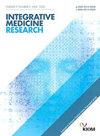Intranasal acupuncture therapy for allergic rhinitis: A systematic review and meta-analysis of randomized controlled trials
IF 3
4区 医学
Q2 INTEGRATIVE & COMPLEMENTARY MEDICINE
引用次数: 0
Abstract
Background
Allergic rhinitis (AR) is a prevalent allergic condition that affects the nasal mucosa. Intranasal acupuncture therapy (IAT), an innovative therapy that involves precisely inserting acupuncture needles into specific nasal acupoints, has demonstrated potential effects in managing AR. The aim of this study is to evaluate the effectiveness and safety of IAT in the management of AR.
Methods
Nine databases were systematically searched for randomized controlled trials (RCTs) from their inception to September 2024. We included participants diagnosed with AR who received IAT alone or as add-on treatment to conventional treatment. The Cochrane risk of bias 2.0 tool and GRADE approach were applied to assess methodological qualities. A meta-analysis was performed using RevMan 5.4.1 software.
Results
Twenty-one RCTs with 1889 participants were included. The certainty of evidence was generally low and moderate. Compared to sham acupuncture, IAT significantly reduced the total nasal symptom score (MD −2.65, 95% CI −4.01 to −1.29, 1 RCT, 30 participants, moderate evidence). Compared to an antihistamine, IAT was associated with a lower total non-nasal symptom score (MD −0.44, 95% CI −0.64 to −0.25, 5 RCTs, 295 participants, moderate evidence) and a better quality of life measured by the rhinoconjunctivitis quality of life questionnaire (MD −13.72, 95% CI −18.01 to −9.43, 4 RCTs, 255 participants, moderate evidence). No serious adverse events were reported.
Conclusion
IAT may be beneficial in improving AR-related symptoms and quality of life. However, the safety of IAT remains unclear due to inadequate reporting. Further high-quality, rigorously designed, and well-reported trials are required.
Protocol registration
PROSPERO, CRD42024526357.
鼻内针刺治疗变应性鼻炎:随机对照试验的系统回顾和荟萃分析
背景:变应性鼻炎(AR)是一种常见的影响鼻黏膜的过敏性疾病。鼻内针灸疗法(IAT)是一种创新的治疗方法,它将针刺针精确地插入特定的鼻腔穴位,已经证明了治疗AR的潜在效果。本研究的目的是评估IAT治疗AR的有效性和安全性。方法系统地检索从建立到2024年9月的随机对照试验(rct)数据库。我们纳入了诊断为AR的参与者,他们单独接受IAT或作为常规治疗的附加治疗。采用Cochrane偏倚风险2.0工具和GRADE方法评估方法学质量。采用RevMan 5.4.1软件进行meta分析。结果共纳入21项随机对照试验,受试者1889人。证据的确定性一般是低和中等的。与假针灸相比,IAT显著降低了鼻症状总评分(MD为- 2.65,95% CI为- 4.01至- 1.29,1项随机对照试验,30名受试者,中度证据)。与抗组胺药相比,IAT与较低的非鼻症状总评分(MD - 0.44, 95% CI - 0.64至- 0.25,5个随机对照试验,295名受试者,中等证据)和鼻结膜炎生活质量问卷测量的更好的生活质量相关(MD - 13.72, 95% CI - 18.01至- 9.43,4个随机对照试验,255名受试者,中等证据)。无严重不良事件报告。结论iat可能有利于改善ar相关症状和生活质量。然而,由于报道不足,IAT的安全性仍不清楚。需要进一步的高质量、严格设计和充分报告的试验。协议注册普洛斯普洛斯,CRD42024526357。
本文章由计算机程序翻译,如有差异,请以英文原文为准。
求助全文
约1分钟内获得全文
求助全文
来源期刊

Integrative Medicine Research
Medicine-Complementary and Alternative Medicine
CiteScore
6.50
自引率
2.90%
发文量
65
审稿时长
12 weeks
期刊介绍:
Integrative Medicine Research (IMR) is a quarterly, peer-reviewed journal focused on scientific research for integrative medicine including traditional medicine (emphasis on acupuncture and herbal medicine), complementary and alternative medicine, and systems medicine. The journal includes papers on basic research, clinical research, methodology, theory, computational analysis and modelling, topical reviews, medical history, education and policy based on physiology, pathology, diagnosis and the systems approach in the field of integrative medicine.
 求助内容:
求助内容: 应助结果提醒方式:
应助结果提醒方式:


